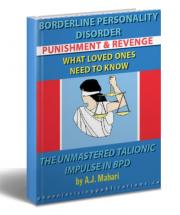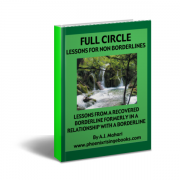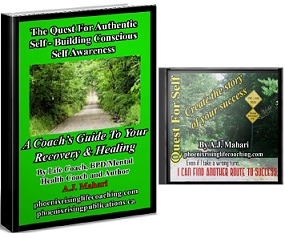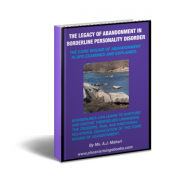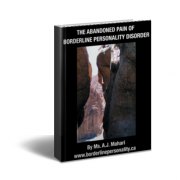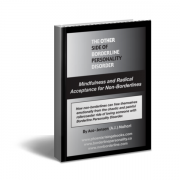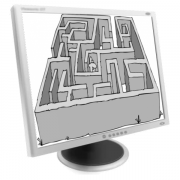Codependence - Where Borderlines and Non-Borderlines Often Meet
A.J.'s Audio Program Borderline Splitting - Understanding for Loved Ones
People with Borderline Personality Disorder and those known as non borderlines who are in relationships to or with them are often codependent. Enmeshment, toxic bonds, and collusion are the common threads that are shared, to varying degrees, by those who are borderline and those who are non borderline. The codependent reality of these toxic relationships often speaks to the reality that both borderlines and non borderlines meet in the middle of what is the relational impossibility of codependence.
co-dependence is not just a "borderline" thing. It is as prevalent with borderlines as it often is with those who develop relationships with them.
As you have likely read before, and as I know that I have said many times before, people who have Borderline Personality Disorder do not have a developed sense of self. Without a developed and known sense of self, a sense of consistent self-esteem is virtually impossible.

"Codependence is about giving away power over our self-esteem. Taking our self-definition and self-worth from outside or external sources is dysfunctional because it causes us to give power over how we feel about ourselves to people and forces which we cannot control. Any time that we give power over our self-esteem to something outside of ourselves we are making that person or thing our higher power.
We are worshiping false gods. If my self-esteem is based on people, places, and things; money, property, and prestige; looks, talent, intelligence; then I am set up to be a victim. People will not always do what I want them too; property can be destroyed by an earthquake or flood or fire; money can disappear in a stock market crash or bad investment; looks change as I get older. Everything changes. All outside or external conditions are temporary." writes Robert Burney in his Column "Codependence vs Interdependence".
A borderline who has not learned to do anything but give away personal power and identity to others because borderlines have not, by the very nature of their personality disorder, been able to develop a known (emotionally-mature) "self" due to the effects of the core wound of abandonment and the on-going impact of the core wound of abandoment from which they could derive any self- defintion, esteem or worth meets the definition of what it is to be co-dependent. Often the borderline (unless this has been worked through) is looking to replace (or in a sense get back) "object relations" that were lost in childhood and development. This is what motivates a borderline to seek identity through those they try to get close to. This is what also results in the borderline push/pull because at the very same time that the borderline is trying to define "self" through other it feels to him or her like annihilation. Whether consciously or unconsciously there is some natural fear and awareness of the loss of "self" that drives the borderline to push with the one hand while pulling with the other. The emotional dysregulation that is triggered in relationships for those with BPD adds to this ever-shifting split between wanting to be close and needing to push others away which is then experienced as abandonment and further amplified by the shame of abandonment that borderlines experience and react to often.
It is this lack of a developed and known sense of "self" and the resulting lack of self- esteem and self-worth that lead the borderline to continually set and re-set themselves up as victims. Often it is the playing out of the dynamic or pattern of relating that occurred and was learned by the borderline in his/her formative years. Since any sense of "self" is fleeting to the unrecovering borderline so too will his/her sense of relating to anyone close be equally as fleeting.
Since everything external is to one degree or another temporary this fuels the borderline's frantic efforts to secure a sense of "self" through others while trying to also control others to make up for what is essentially an inability to control themselves. This seeking "identity" and "self" along with worth externally also adds a very inconsistent and fleeting experience of "who the borderline" is for both the borderline and anyone close to him/her. The very nature of this fleeting experience of the borderline by family members, loved ones, or relationship partners - non borderlines - creates the puzzle and mystery of hope on the other side of BPD.
To the extent that borderlines are often co-dependent, they are not alone. Countless numbers of others are also co-dependent. It would seem that co-dependents have a way of finding each other. Once two co-dependents enter into a relationship, (friendship or romantic) the dynamic begins to unfold, the roles become defined and the painful dance begins of a toxic dynamic begins.
A major part of that dance, among other things, including the laying of blame. The "blame game" is something that (most often) both the borderline and the non-borderline engage in. As any codependent and toxic relationship dynamic deepens both the borderline and the non borderline try harder to convince each other of their own sense of what is true and right and of who has done what to whom.

Each person in the co-dependent dynamic has a role in what takes place and is responsible for being engaged to one degree or another in the "dance". One does not have to be borderline to be co-dependent. In fact, I have stated in other articles that I believe, based on my own past experience (and all the email I get from those searching for recovery, both borderlines and non-borderlines) that borderlines are essentially co-dependent as are the people who enter into friendships and especially romantic relationships with them are. One has to be in "need" of the dynamic (for whatever reason) in order to end up in it. We do make these choices. Part of recovering from co-dependency is being willing to look at this reality and to take personal responsibility for it.
Robert Burney, who is (among other things) a co-dependence therapist and author of the book, "Codependence: The Dance of Wounded Souls", goes on to describe co-dependence this way:
Codependence "is about having a dysfunctional relationship with self! With our own bodies, minds, emotions, and spirits. With our own gender and sexuality. With being human. Because we have dysfunctional relationships internally we have dysfunctional relationships externally. "Actually the term "Codependence" is an inaccurate and somewhat misleading term for the phenomenon it has come to describe. A more accurate term would be something like outer-dependence, or external dependence."Borderline traits are not limited to borderlines. It is the intensity and degree of presentation of those traits that denotes a borderline from a non-borderline. It "should" not come as such a surprise then that both the borderline and the non-borderline (more often than not) experience in relation to and with one another this dynamic of a dysfunctionally co-dependent relationship.
To deal with the reality and dyanmic of co-dependence in any relationship both parties must learn how to meet their own needs. They must also learn that other issues or disorders notwithstanding, co-dependence is prevalent in society today. Recovery from co-dependence is about knowing that you want and deserve healthier relational reality with anyone and everyone that you know in your life. It is about identifying, accepting, and taking personal responsibility for your own issue and challenges in life and pain and/or unhappiness that arise from those issues.
Non borderlines will benefit from learning and understanding much more about the central dilemma on the other side of BPD Can Borderlines Love? Do Borderlines Feel Love? along with coming to terms with and overcoming denial about BPD and love.
For the borderline recovery from BPD very much involves seeking an active recovery from co-dependence. In the process of healing both it is necessary for the borderline to work through the issues that inhibited their emotional maturation process. One must become fully emotionally adult, take personal responsibility for themselves, build his/her own sense of self (identity), self-esteem and self-worth. If you are co-dependent you NEED to learn to validate yourself from the inside out and you must stop seeking others to define you and or to meet your needs for you. (borderline or not)
For the non borderline recovery involves learning to either develop his/her own sense of self-esteem and worth by understanding the impact of the core wound of abandonment in BPD and by actively enagaging his or her own process of Breaking Free From the BPD Maze. Sometimes, when relating to borderlines, just to survive the inconsistencies and the fog - fear, obligation, and guilt - presented by the borderline, the non-borderline loses the sense of self that they once had. However, this loss of self for the non-borderline represents a "giving up of oneself" in order to meet the needs of "other". (usually the borderline in their lives).
I believe many non borderlines do not recognize the degree to which they are lacking the tools for a healthy relationship themselves. Many non borderlines accept the verbal abuse and abuse of all types related to borderline rage as something that they must endure or put up with to maintain a relationship and/or as something they can change in the borderline to make everything okay. More often than not to get to the point in relation to anyone where you, the non-borderline, feel as though you have lost your "self" to someone else (the borderline) may well be evidence that your boundaries and sense of "self" weren't what you thought they were. For many non borderlines (who may have had a borderline parent) these co-dependent issues are no more visible for them until the relationship dynamic unfolds than the borderlines issue were for the borderline.
A.J.'s Audio Program Borderline Splitting - Understanding for Loved Ones
Each person in a friendship, or romantic relationship is responsible for meeting his/her own needs. When that line gets blurred, essentially, that is what co-dependence is. We are not taught, generally, growing up how to develop a very healthy sense of self, self-esteem and self-worth. More people than not are effected by some measure of dysfunction in their families of origin. Co-dependence is also very much portrayed as "love" by the media in movies. A prime example of this was the movie "Jerry McGuire" -- specifically the line where Tom Cruise turns to his love interest in the movie and says: "You Complete Me" - that may seem romantic but it is really representative of a core belief that leads so many to end up in codependent relationships - that illogical magical thinking that somehow you need someone else to complete you. Mental health is about being a person, an entity with an identity, personhood and a functioning and defined self on one's own first and then finding someone else who is also his or her own person in order that a healthier inter-dependent relationship can develop and be sustained.
That line, "you complete me" from the move "Jerry McGuire" is like a wayward mantra of our culture (at least in the west) these days that we need to have someone else "complete us"; that we cannot be complete on our own. If you are alone in many cultures you are seen and defined as defective. This attitude needs to change. The messages that our culture bombard us with about what makes a friendship and or a relationship also need to change. To avoid being co-dependent, borderline or not means, that you have to be a "complete" person all on your own. Complete in this sense refers to being able to meet your own needs and to take care of yourself, having identified, formed, and enforceable boundaries. Two people coming together in a relationship "should" enhance one another not "need" one another to survive.
When I was borderline I knew nothing but co-dependence. I didn't even know it was a problem because it was my life. It literally was, all that I knew. Now, though I can say that it was a very painful way to live. I am not so sure that I was co-dependent because I was borderline. However, I know I was co-dependent because I never learned who I was. I never had a consistent sense of self. I lived through others. Being borderline and co-dependent were to some degree related in that it was the way that I was taught how to relate -- period. In the process of my recovery from BPD it was very eye-opening to discover the concepts of personal responsibilty and inter-dependence.
Looking back now, years after my recovery from BPD, I can clearly see what inhibited me from developing the sense of, connection to, and relationship with my authentic self - as self that I now know and am connected to and intune with. I can also see that not having that sense of self left me "needy", feeling like a victim, and seeking to fill myself up from the outside in. We must, borderline, or not, learn to fill ourselves up from the inside out.
Robert Burney also states that: "This dance of Codependence is a dance of dysfunctional relationships - of relationships that do not work to meet our needs. That does not mean just romantic relationships, or family relationships, or even human relationships in general. The fact that dysfunction exists in our romantic, family, and human relationships is a symptom of the dysfunction that exists in our relationship with life, with being human. It is a symptom of the dysfunction which exists in our relationships with ourselves as human beings."
Another thing that borderlines very much have trouble with is loss. Learning to let of what does not work for us is essential for both the borderline and the non borderline. Why do so many, both borderlines and non borderlines remain in relationships long after they've stopped working? I believe that there are as many answers to that question as there are co-dependents. A primary reason though is that, borderline or non borderline, to let go means having to face the pain of that letting go - that loss - and of change. Often, rather than do that, borderlines try to take hostages to avoid so many of their issues, vulnerability, personal responsibility, abandonment fears and unresolved abandonment issues along with fear of rejection and loss to name a few. They choose, instead, yes choose, to live a life steeped in a chaos that keeps one from having to sit still long enough to face his/her own pain. For the non borderline the choice is not much different. The motivation my not be exactly the same but often the non borderline does not want to Break Free which is often perceived as "giving-in" or "giving up" and is equated with "losing" or to have to admit that they too have taken part in keeping a degree of chaos going that met their needs to avoid loss and the facing of change. Non borderlines have a lot of their own lessons to learn that can teach them so much about what they are contributing to their own pain and unhappiness and how they can create the change they need for themselves.
"Active" borderlines are extremly challenged when it comes to maintaining relationships. They can often perpetuate a tremendous amount of "self"-destructive and "other"-destructive behaviour. It can be crazy-making. The non-borderline, however, (in more cases than not) has a considerable amount of responsibility to share with the borderline for the dynamic of the dance of co-dependency.
Simply put: "It takes two to tango."
It is in the center of this issue -- co-dependency -- where the borderline and the non-borderline meet with (to one degree or another) a sense of shared reality simply because both are human. Neither is perfect. Some people just cannot develop a dynamic that can work in relation to each other. Co-dependence is not a borderline reality, it is a human reality.
A greater degree of recovery can be found for both the borderline and the non borderline (together or a part) when each takes the responsibility for meeting his/her own needs and when each realizes the limitations of what they can and cannot control. Anything short of this is not going to lead to healthier relating or a healthier relationship.
© Ms. A.J. Mahari - February 4, 2000 - with additions November 18, 2008
A.J. Mahari is currently writing a memoir about her life and experience as a person who had two parents with Borderline Personality Disorder, as a person who was diagnosed herself with BPD at the age of 19 and from her perspective as someone who has recovered from BPD. There is a new section on her BPD Blog called The Diary - My Borderline Years where A.J. Mahari shares snipets of experience from her own life that is will give you just a taste of what her memoir will include.
Audio Program "Preparing For Recovery From BPD" Parts 1 & 2 by A.J. Mahari
Audio Program Rage Addiction in BPD by A.J. Mahari (sold separately or packaged with Mahari's Ebook, "Rage and BPD")
- Purchase all 3 of ebooks for NON BORDERLINES
- Non Borderlines - You can purchase 6 ebooks packaged together with or without audio.
- Those with BPD and/or Non Borderlines can purchase A.J. Mahari's 3 "Core Wound of Abandonment" series ebooks packaged together with or without audio.

No reproduction in whole or in part without the written consent of A.J. Mahari. To seek permission to re-produce anything on this site or to link anything on this site please email me at bpdinsideout@yahoo.ca - I do not give my consent for anything I've written to be re-produced on any other website without my expressed permission. If you wish to link to an article I've written please link directly to the article page on this site - thanks so much!






